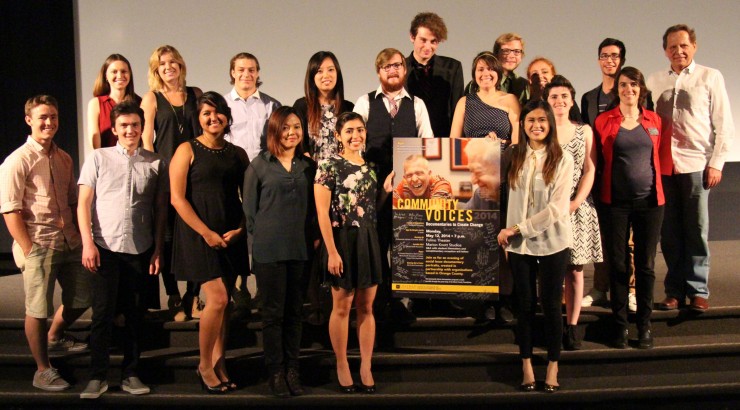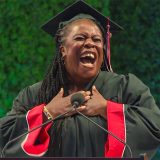
Community Voices Screening Brings Awareness to Social Issues in Orange County
May 14, 2014
“You don’t know someone’s story just by looking at them. You have to get to know them to really know what they are going through.”
Those words, spoken by one of the students in the Community Voices program, rang especially true after viewing the six films featured at the screening this past Monday night.
The Community Voices initiative is a program that teaches students ways to tell creative, non-fiction stories about social issues in the Orange County area and its surrounding communities. Under the guidance of documentary professor Sally Rubin, the students are paired up with local non-profit organizations to create a documentary pertaining to them. In addition to that, they are also tasked with creating a short PSA, to help raise awareness for their particular issue. This was the program’s 8th semester, and has so far produced 37 documentaries on various topics.
“We tried to find a subject we knew very little about, and learn from it from a human perspective. We wanted to find a way to connect with it on a personal level,” said Matt Rogers (BFA/Film Prod. ’14), one of the young filmmakers whose film, Starving Artist, profiling the Mental Health Association of Orange County, premiered last night.
What was most striking was that while each of the films was based around a very broad topic, ranging from mental illness to immigration laws to the destruction of a local orange grove, they all focused on an individual who was directly affected by it. Most of the films were the story of these particular people, and how they were struggling to cope with the challenges they faced.
“It was rewarding to tell their story,” said Nicholas McDonald (BFA/Television & Broadcast Journalism ’16) during the Q&A session. “It was amazing to realize how many people have these great, untold stories. And if we don’t tell them, who will?”
For many of the filmmakers, they faced problems during the course of their production that they had never faced before. Some of the biggest challenges included coordinating schedules, extensive travel time, and figuring out the story of their films.
“There were so many different angles we could have went with, and we had to really narrow down what our focus would be. We had three different story lines, and it was difficult to choose which one would be the most effective, the most powerful,” said Rachel Howell (BA/English ’14).
Despite the challenges, each team agreed that it was a fantastic learning experience. Working with their small teams, they had to learn to trust each other, and really get into the collaborative process. Some students even took away more from the class than they expected.
“I was so moved by the issues that I actually added some political science courses to my schedule, to help better understand some of the other issues I’d like to tackle in documentaries in the future,” said Matt Rogers.
The Community Voices initiative is made possible through the generous support of The Dhont Family Foundation.


